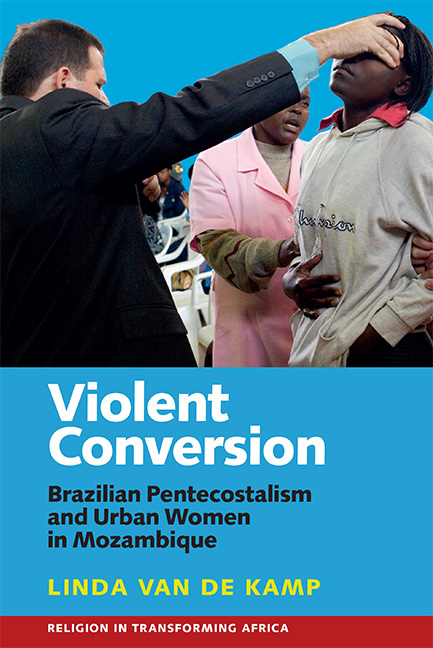Book contents
- Frontmatter
- Contents
- List of Illustrations
- Acknowledgements
- Introduction
- 1 Gender, Family and Social Transformations in Maputo
- 2 Transnational Spaces of Conquest
- 3 Moving Frontiers: the Generational Trajectories of Pentecostal Women
- 4 Converting the Spirit Spouse
- 5 Terapia Do Amor: Confrontational Public Love
- 6 ‘Holy Bonfires’ and Campaigns
- Conclusion: Violent Conversion
- Bibliography
- Index
4 - Converting the Spirit Spouse
Published online by Cambridge University Press: 24 October 2017
- Frontmatter
- Contents
- List of Illustrations
- Acknowledgements
- Introduction
- 1 Gender, Family and Social Transformations in Maputo
- 2 Transnational Spaces of Conquest
- 3 Moving Frontiers: the Generational Trajectories of Pentecostal Women
- 4 Converting the Spirit Spouse
- 5 Terapia Do Amor: Confrontational Public Love
- 6 ‘Holy Bonfires’ and Campaigns
- Conclusion: Violent Conversion
- Bibliography
- Index
Summary
On a warm Saturday evening in January 2007, Julia took me to Teatro Avenida to see the play Niketche. The play is based on the novel of Mozambique's famous female writer Paula Chiziane. The central character is the woman Rami, who is married to Toni and living in an illusion of a perfect love. Rami discovers that her Toni is a ‘national husband’, a fierce polygamist; he has various lovers. During the story, Rami gets to know her co-wives, and together the women start to confront their husband with the consequences of his polygamic behaviour. The promotion flyer of the theatre explains that the play aims to demonstrate the labyrinth of conflicting and contradictory emotions that reflect ‘the condition of the woman in a world of convergences between the traditional and the modern’. Afterwards Julia and I chat about Niketche, and she tells me that while she lives with her parents, she owns a house in the city centre that she rents out to expats to be able to pay her mortgage. She says, ‘Several men want to rent my house and want me to be waiting for them. But I never know when they will come, so I need to wait all the time. Why should I make myself dependent on them?’
Later, she tells me that during the past week, for the first time in her life – she is aged 40 – she participated in a Ronga marriage. The ceremony lasted two days. On the first day, the lobolo was celebrated at the house of the bride's family, and on the second day, the civil marriage took place, and the party continued at the house of the family of the bridegroom. I was somewhat surprised that this was her first time to attend such a marriage. Julia commented that the women in her family do not marry, ‘because they suffer from a kind of spirit’. It was then that she started explaining that her father had not wanted to do the lobolo for her mother (Chapter Three):
luckily, my mother had six children, but now they do not marry. We do not meet the right man. They see us as an object and not as a woman. The men we like always leave us and we stay with the bad men. Our colour [she points to her skin] is very complicated, Africa is like this.
- Type
- Chapter
- Information
- Violent ConversionBrazilian Pentecostalism and Urban Women in Mozambique, pp. 103 - 130Publisher: Boydell & BrewerPrint publication year: 2016

